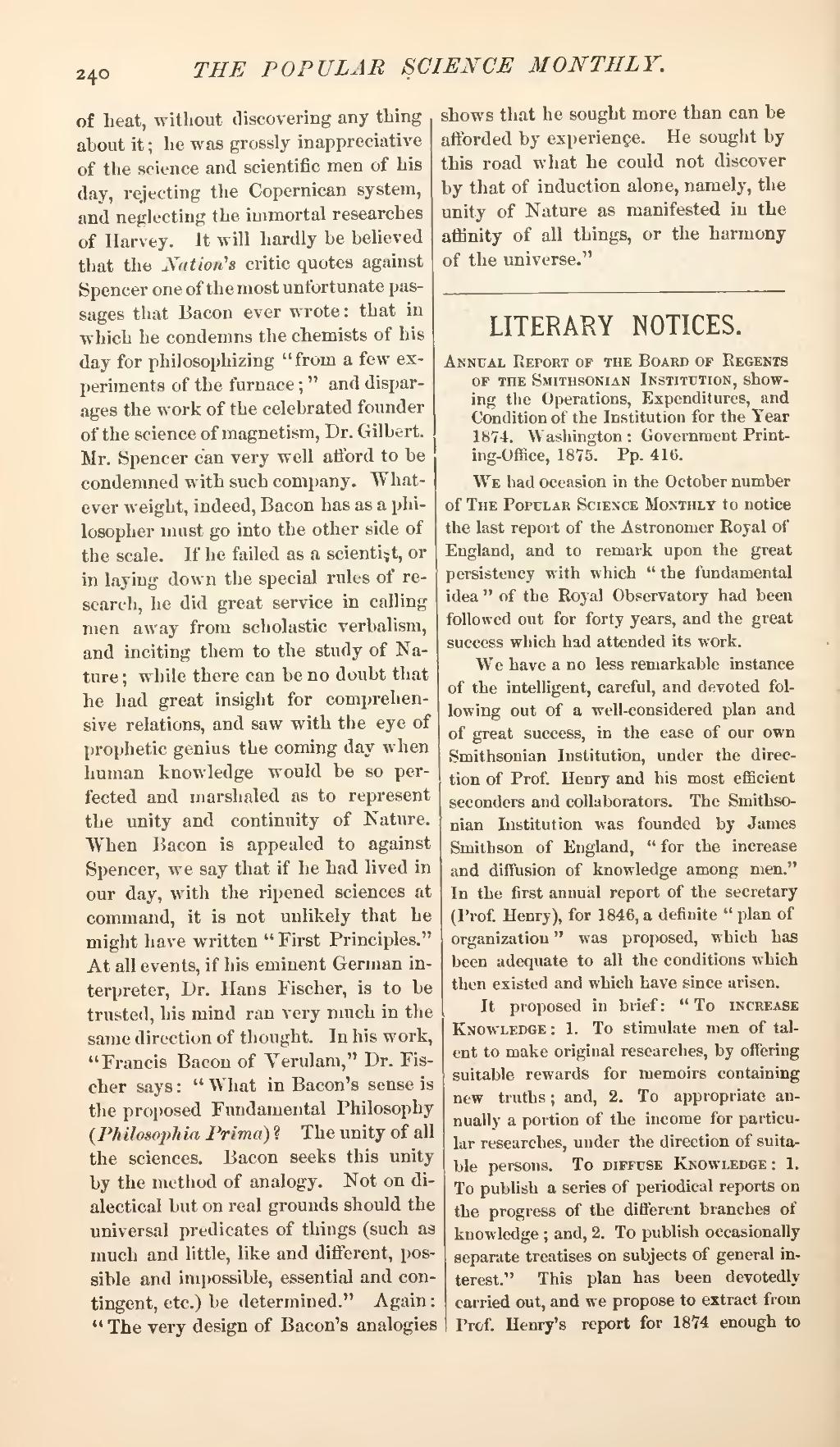of heat, without discovering any thing about it; he was grossly inappreciative of the science and scientific men of his day, rejecting the Copernican system, and neglecting the immortal researches of Harvey. It will hardly be believed that the Nation's critic quotes against Spencer one of the most unfortunate passages that Bacon ever wrote: that in which he condemns the chemists of his day for philosophizing "from a few experiments of the furnace;" and disparages the work of the celebrated founder of the science of magnetism. Dr. Gilbert. Mr. Spencer can very well afford to be condemned with such company. Whatever weight, indeed, Bacon has as a philosopher must go into the other side of the scale. If he failed as a scientist, or in laying down the special rules of research, he did great service in calling men away from scholastic verbalism, and inciting them to the study of Nature; while there can be no doubt that he had great insight for comprehensive relations, and saw with the eye of prophetic genius the coming day when human knowledge would be so perfected and marshaled as to represent the unity and continuity of Nature. When Bacon is appealed to against Spencer, we say that if he had lived in our day, with the ripened sciences at command, it is not unlikely that he might have written "First Principles." At all events, if his eminent German interpreter, Dr. Hans Fischer, is to be trusted, his mind ran very much in the same direction of thought. In his work, "Francis Bacon of Verulam," Dr. Fischer says: "What in Bacon's sense is the proposed Fundamental Philosophy (Philosophia Prima)? The unity of all the sciences. Bacon seeks this unity by the method of analogy. Not on dialectical but on real grounds should the universal predicates of things (such as much and little, like and different, possible and impossible, essential and contingent, etc.) be determined." Again: "The very design of Bacon's analogies shows that he sought more than can be afforded by experience. He sought by this road what he could not discover by that of induction alone, namely, the unity of Nature as manifested in the affinity of all things, or the harmony of the universe."
Annual Report of the Board of Regents of the Smithsonian Institution, showing the Operations, Expenditures, and Condition of the Institution for the Year 1874. Washington: Government Printing-Office, 1875. Pp. 416.
We had occasion in the October number of The Popular Science Monthly to notice the last report of the Astronomer Royal of England, and to remark upon the great persistency with which "the fundamental idea" of the Royal Observatory had been followed out for forty years, and the great success which had attended its work.
We have a no less remarkable instance of the intelligent, careful, and devoted following out of a well-considered plan and of great success, in the case of our own Smithsonian Institution, under the direction of Prof. Henry and his most efficient seconders and collaborators. The Smithsonian Institution was founded by James Smithson of England, "for the increase and diffusion of knowledge among men." In the first annual report of the secretary (Prof. Henry), for 1846, a definite "plan of organization" was proposed, which has been adequate to all the conditions which then existed and which have since arisen.
It proposed in brief: "To increase Knowledge: 1. To stimulate men of talent to make original researches, by offering suitable rewards for memoirs containing new truths; and, 2. To appropriate annually a portion of the income for particular researches, under the direction of suitable persons. To diffuse Knowledge: 1. To publish a series of periodical reports on the progress of the different branches of knowledge; and, 2. To publish occasionally separate treatises on subjects of general interest." This plan has been devotedly carried out, and we propose to extract from Prof. Henry's report for 1874 enough to

